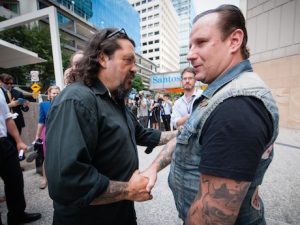Australia’s High Court will be asked to overturn more than a dozen sections of the Newman Government’s VLAD Act and “anti-bikie” legislation. The first challenge to the laws was lodged in Brisbane at noon today. Among the attacks on the validity of the laws, the challenge will contest the anti-association legislation used to arrest Brisbane librarian Sally Kuether (see story below), as well as the laws which remove discretionary power from Queensland’s judiciary.
Barrister Wayne Baffsky said the challenge argued that the laws were unconstitutional because they created inequality before the law, prevented people from exercising their right to meet for political reasons, denied innocent people the protection of the rule of law, and breached Australia’s human rights obligations. “It’s important to realise that this is not simply about the much-publicised VLAD Act, which is just one part of the laws being contested,” Mr Baffsky said. “This High Court challenge addresses the problems the Newman Government has introduced into Queensland’s Criminal Code, Bail Act, Police Powers and Responsibilities Act, Crime and Misconduct Act, and Corrective Services Act, to name a few.”

An appeal to the High Court must be brought on behalf of an individual, and Stefan Kuczborski – a Hells Angel, working tattooist and member of the United Motorcycle Council of Queensland (UMCQ) – said he had “put his hand up” to be the applicant in the UMCQ-funded challenge. While Mr Kuczborski has not been arrested under the harsh Queensland laws, he is eligible to challenge them in a “special case” because he is subject to the legislation.
“My family left Poland to escape Communism and to live in a free country. Instead, it’s about to become illegal for me to work in the only job I know, and it’s a crime for me to have a beer at the pub with two of my friends,” Mr Kuczborski said. “Even if I were to leave my club tomorrow, or if I left it 20 years ago, these laws still apply to me.”
Mr Kuczborski said that contrary to what politicians would say about him, he was not challenging the laws because he supported or planned to commit any crimes. “The politicians in this state are saying that anyone who objects to these laws is supporting crime. That’s simply untrue,” he said. “If someone is convicted of a serious crime, punish them for that crime. But don’t stop people working or lock them up because of who they know, who they want to be friends with, and what you think they might or might not do in the future. I put my hand up to fight this because these laws are not right and the spirit of them goes against everything that I thought Australia stood for.”
UMCQ spokesman Mick Kosenko said the Council would support reasonable legislative measures to reduce crime, but that “creating new crimes” was not the answer. “Crime should be investigated, proven to a consistent standard and then appropriately punished. Existing laws do that,” he said. “What these laws have done is created new crimes rather than preventing real crime, and taken away the discretion of judges to punish crime fairly.
Mr Baffsky said very few motorcycle club members had been arrested since the laws were introduced, with none arrested for organised crime or serious criminal offences. “There’s no question that there are some people who belong to motorcycle clubs and do the wrong thing, but the most serious criminals in society are unlikely to be riding around wearing a big patch and choosing to be loud and obvious,” he said. “The Newman Government has used club members as an excuse to go too far with these laws, a large impact of which has been to hurt innocent people. Another impact has been to introduce complexity and confusion with laws that few people understand, including some of the politicians who introduced them and the police who enforce them.”


